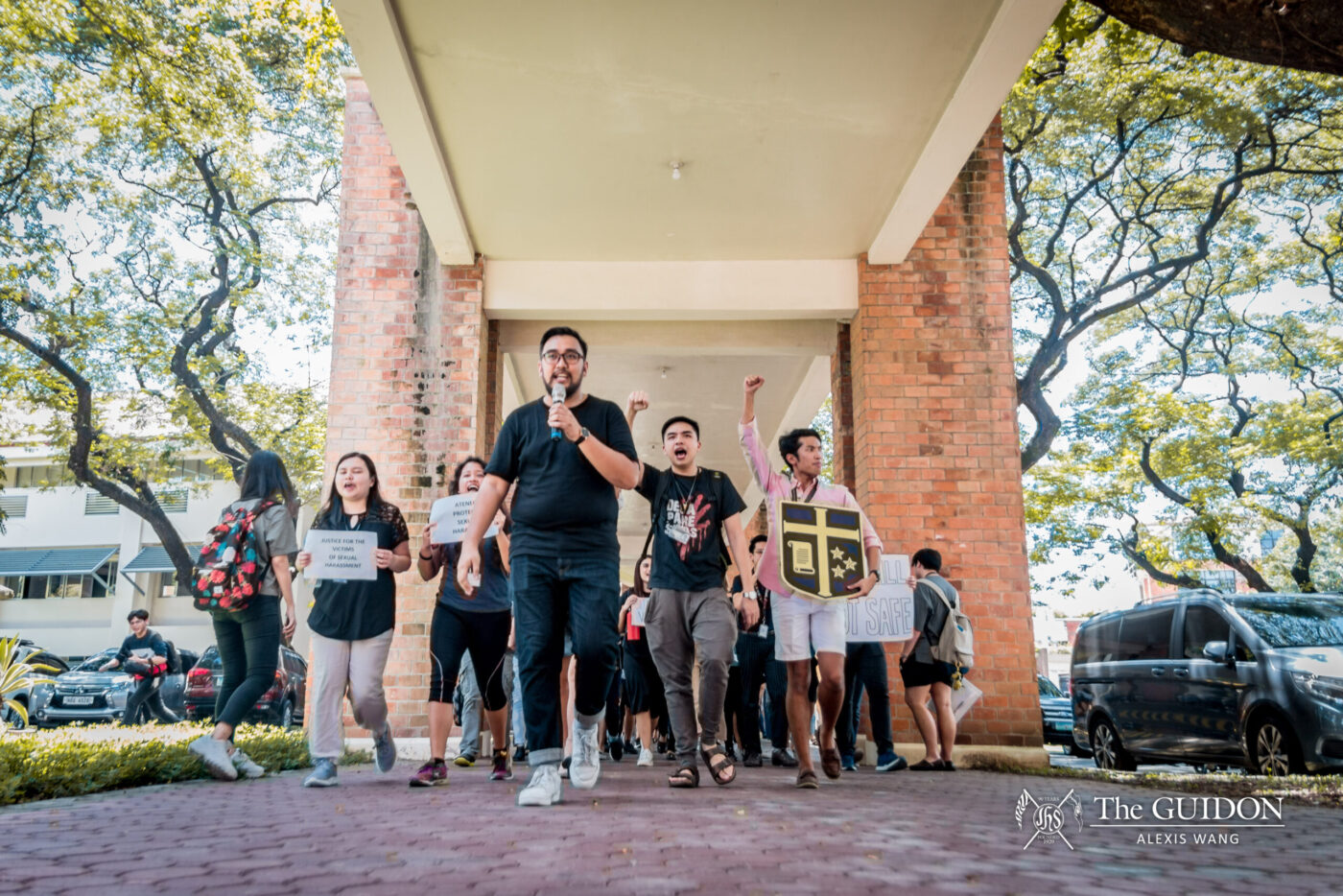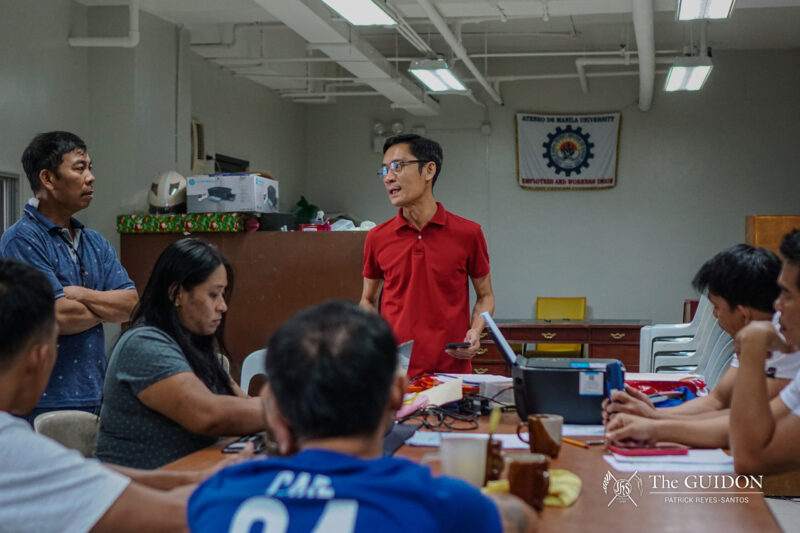Trigger warning: This article contains mentions of sexual harassment, violence, and misconduct
FIVE YEARS since its establishment, Time’s Up Ateneo (TUA) has continued its efforts to shed light on issues of sexual violence and impunity by actively monitoring the University’s implementation of the Code of Decorum and Administrative Rules on Sexual Harassment, Other Forms of Sexual Misconduct, and Inappropriate Behavior (Code and Rules).
Similarly, the Ateneo community has continually echoed this commitment through initiatives like the Sexual Assault Awareness Month from gender arms such as the University Gender Hub and the Sanggunian Commission on Anti-Sexual Misconduct and Violence (CASMV).
TUA emerged in the immediate aftermath of a multi-sectoral indignation protest against an incident of sexual misconduct on campus that occurred two days prior its formation on October 17, 2019. According to founding member Luther Aquino (AB PHILO ‘13), the organization was formed to raise the issue of sexual violence and impunity on the Ateneo campus.
Succeeding this protest, TUA contributed to the passing of the Code and Rules, in collaboration with the Ateneo administration and the Sanggunian. It also utilized its platform for uplifting the stories of survivors and advocates to highlight the importance of safe spaces.
Upon taking effect in 2020, the Code and Rules expanded the University’s definition of misconduct to include gender-based and peer-to-peer harassment. It also covered additional offenses such as sexual assault, exploitation, voyeurism, and inappropriate behavior.
Echoes of the protest
Following the events of October 15, 2019, Aquino stated that TUA broke the silence regarding visibility toward survivors of Sexual and Gender-Based Violence (SGBV) in the University.
He added that while many of its members are no longer formally affiliated, TUA remains dedicated to monitoring the University’s actions in rectifying past injustices. “That has always been [TUA’s] goal—to continue to stand with survivors and hold the institutions that have failed survivors into account.” Aquino asserted.
Meanwhile, Dasha Uy (AB DipIR ‘18), another founding member of TUA, highlighted that the University’s Code and Rules are due for an update, noting that it has already been four years since its initial passing.
Uy also expressed that the TUA can “take a step back,” considering how various gender arms of the University continue the call to improve the University’s SGBV response.
Grounding a legacy
Serving as the first point of contact for grievances from students, CASMV has also initiated efforts to continually aid TUA’s mission of improving safe spaces, assisting SGBV survivors—even non-Ateneans—in filing cases against alleged perpetrators.
According to CASMV Co-Commissioner Beyonce Acidera, the commission contributed to the shaping of University policies and practices related to sexual misconduct by ensuring survivor-centric language in official statements and policies.
The commission also consistently reviews admin announcements, making sure that sensitivity is observed in statements, and official communications align with its mission of survivor empowerment.
As part of its initiatives to raise awareness on gender-based violence and empower survivors, CASMV officially launched its March of Women flagship project last February. The initiative is a month-long celebration of the journeys and talents of women, both within and beyond the Ateneo, through survivor-centric activities such as community discussions and fundraising efforts.
In consultation with CASMV and the University Gender and Development Office, the Council of Organizations of the Ateneo – Manila (COA-M) also spearheaded the establishment of the Safe Spaces Declaration for student organizations in 2023.
In its official online launch, COA-M noted that this declaration was a step toward ensuring that members of student organizations “commit themselves to maintaining an environment free of sexual and gender-based violence, harassment, or any form of harm.”
Moving forward
Determined to further their advocacy of creating a safe space for the Ateneo community, CASMV Co-Commissioner Isa Novicio acknowledged TUA’s significant impact on SGBV-related policies within the Ateneo.
“[TUA] started the idea that […] this is our school [and so,] we deserve to feel safe in it. […] I give credit to TUA for protests that empowered victim-survivors to be active in those mobilizations and calling out the administration because we can see that through the new policies implemented by the University, those protests work,” Novicio said.
Moreover, Novicio emphasized the need for student representation in creating University policies on gender and sexuality. She cited other gender arms that advocate for “victim-survivors across different communities and walks of life,” such as the Sanggunian Commission on Gender Equality and the Spaces for Women’s Art and Narratives.
She emphasized that policies are not “one size fits all,” and must be carefully crafted to support different members of the community.
Echoing TUA’s call to address the issue of sexual violence and impunity on campus, Acidera reiterated the CASMV’s commitment to upholding a survivor-centric approach within the Atenean community.
To continue fostering safe spaces for Ateneans and beyond, she added that CASMV’s initiatives for this academic year include “Gender Sensitivity Training Cycles” for student organizations. The training cycles aim to highlight safe spaces and the principles of Sexual Orientation, Gender Identity, and Expression.
Beyond the hill
While Uy recognized the Ateneo community’s efforts to address SGBV, she called attention to how the administration can take further steps in extending support to non-Ateneans outside the University’s systems.
“Sexual harassment or sexual abuse [does not just happened within Ateneo]—an Atenean can very well abuse somebody outside the system. When somebody outside the system goes through [Ateneo’s] system, it’s a completely different way of doing things, [and] it can be very difficult to navigate,” she stated.
Following this, Uy pointed out how Ateneo “can be very impenetrable,” making it difficult for non-Ateneans to navigate Ateneo support systems without knowing anyone associated with the institution.
On the other hand, Aquino recounted that only a few members of the Ateneo community had been willing to embrace the events of October 2019 as part of the University’s institutional memory. He pointed out how this unwillingness of institutions is reflected in those who speak up against sexual violence across the world.
As such, Aquino reiterated the importance of amplifying TUA’s “core reason for existence,” which is to demand justice, promote healing for survivors of sexual violence, and remember the survivors who stood their ground on October 15, 2019, both in Ateneo and beyond.
ERRATUM: Times Up Ateneo Founding Member Luther Aquino graduated from the Ateneo de Manila University last 2013. Meanwhile, Aquino left the University as a faculty member in 2021. The article has already been updated to reflect this. We apologize for the oversight.







